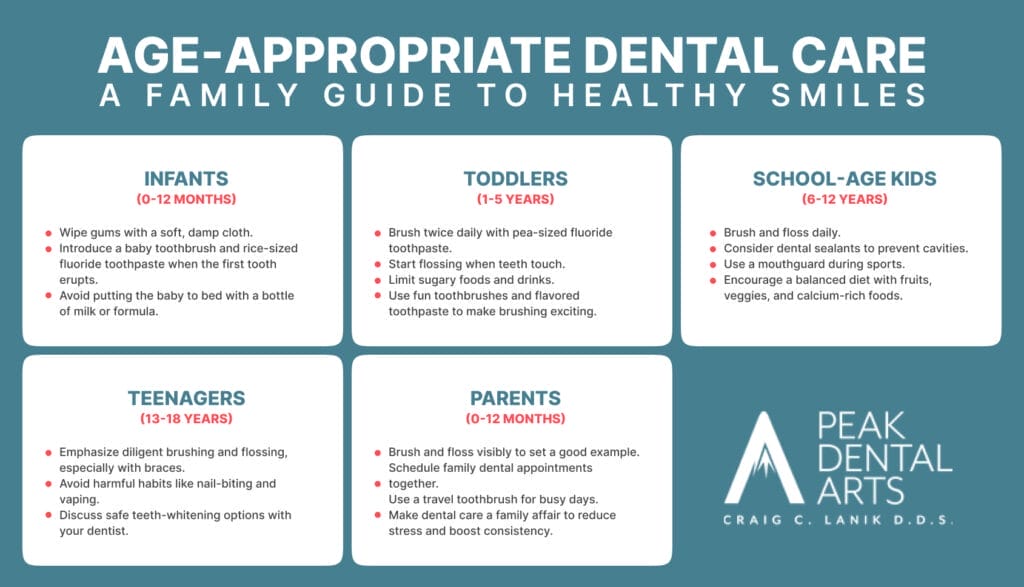As parents, ensuring your child’s dental health is a top priority, but it’s essential to know that each stage of their development requires different care since there are many common dental issues. From the first tooth to the teen years, understanding the best age-based dental care tips for growing families, can make a big difference in maintaining healthy smiles for each member of your family.
This guide offers expert advice for every stage of growth so you can confidently support your child’s oral health journey.

Dental Care for Infants (0-12 Months)
Infant dental care may not be at the top of your priority list, but it’s never too early to start thinking about your child’s oral health. In fact, the first year of life is the most critical in developing healthy habits that will benefit your child’s smile for years to come. As baby’s teeth start to erupt and those first teething gums appear, it’s time to introduce a little oral hygiene into your daily routine.
Infant and Baby Dental Care Tips
- Wipe Gums: Before you see any teeth, your baby’s gums can be gently wiped with a soft, damp cloth or an infant gum cleaner. This not only removes bacteria but also gets your little one accustomed to the routine. When teeth finally start coming in, you can switch to a soft toothbrush and baby toothpaste.
- Baby Toothbrush and Toothpaste: When your baby’s first tooth emerges (usually around six months), it’s time to bring out the baby toothbrush. Opt for a soft-bristled brush and a toothpaste the size of a grain of rice. This fluoride toothpaste will not only clean baby’s teeth but also help prevent cavities.
- Don’t Send Baby to Bed with a Bottle: One of the most common causes of baby bottle tooth decay is sipping on milk or formula throughout the day, especially before bedtime. If your baby needs a late-night snuggle feeding, make sure it’s water, not milk or formula, in the bottle.
When to Take Your Baby to the Dentist
Make sure to book your baby’s first dental appointment by their first birthday or when their first tooth erupted (whichever comes first). This early visit will give our dentist in Uniontown a chance to examine the development of the baby’s teeth and gums, and it’s a great way to introduce your little one to the dentist in a positive way.
Dental Care for Toddlers and Preschoolers (1-5 Years)
Caring for your little one’s teeth (1-5 years old) is so important. Their “baby teeth” are important for chewing, helping with proper speech, and saving space for those big, permanent teeth. This is the time to establish good habits and make dental care fun!
Tips for Little Ones
- Brushing & Flossing 101: Your little one needs a soft-bristled toothbrush and a tiny amount of fluoride toothpaste (about the size of a pea). Show them how to brush twice a day and help them get all their teeth clean. It’s a big job for little hands, so be prepared to assist until they’re about six years old. When teeth touch, it’s time to introduce flossing. Colorful, flavored toothpaste and toothbrushes are great ways to make cleaning teeth fun! Use a story to help them remember to brush: “Front and back, up and down, round and round!” You can also introduce tips for kids to get excited about flossing, like using fun floss picks, sticker charts, or turning floss time into a game—these small efforts make flossing more enjoyable and help build lifelong habits.
- Fluoride: A Little Goes a Long Way: Fluoride can be a great ally in preventing cavities, but it can be detrimental to teeth in high doses. Use fluoride toothpaste, like Hello Kids Magical Mermaid Flouride Toothpaste, and limit fluoride supplements to your dentist’s recommendations.
- Sweets & Treats: Sugary foods and drinks, like juice and candy, can be cavity-prone. Limit or avoid these treats and opt for healthy options like fruits, veggies, and water instead. If your little one does enjoy a sugary treat, make sure they brush their teeth afterward!
- Regular Dental Visits: Schedule dental cleanings and check-ups for your little one every six months. These visits are important for preventing problems, and your dentist can advise you on your child’s specific needs and offer personalized tips!

Dental Care for School-Aged Children (6-12 Years)
Dental development is a busy process during the school-age years. Children are losing their baby teeth, and permanent teeth are coming in. Good dental habits now will help ensure a healthy set of teeth for the rest of their lives.
How to Care for Your School-Age Child’s Teeth
- Make Brushing and Flossing a Top Priority: Remind your child to brush their teeth at least once a day with fluoride toothpaste and to floss once a day to remove plaque from between their teeth. If your child has trouble brushing all four surfaces of their teeth, supervise their brushing until they can do a thorough job on their own.
- Protect Teeth from Sports Injuries: If your child plays sports, a mouthguard can protect their teeth and gums from injury. A custom-fitted mouthguard offers the best protection, but an over-the-counter mouthguard can also be effective.
- Consider Dental Sealants: If your child is at high risk of cavities, have your dentist apply dental sealants on the chewing surfaces of their molars. Sealants are a clear, protective coat that prevents chips and cavities.
Promote a Healthy Diet and Eating Habits
Encourage your child to eat a variety of fruits, vegetables, and calcium-rich foods for strong, healthy teeth and bones. Stay away from sugary treats and snacks that tend to get stuck in your teeth. Instead, offer healthy options and encourage your children to drink water with meals. This will help wash away food and reduce the risk of cavities.
Dental Care for Teenagers (13-18 Years)
From awkward smiles to orthodontic woes, teenage years can be tough on teeth and gums. As wisdom teeth start to emerge, it’s essential to monitor oral health closely. With more freedom and independence comes greater responsibility, making it crucial to stress the importance of good oral hygiene habits.
Top Tips for Teen Dental Care
- Make Oral Hygiene a Priority: Teens with braces or clear aligners need to be extra diligent with brushing and flossing. To prevent plaque, cavities, and white spots, orthodontic-specific floss (like floss threaders) or a water flosser is recommended to make cleaning around wires and brackets much easier.
- Break the Oral Habit Habit: Nailing your nails, chewing on pens, or using your teeth as a tool can cause serious damage to teeth and orthodontic work. Help your teen find healthier ways to cope with stress and anxiety.
- Warn About Tobacco and Vaping: Tobacco products and vaping devices can cause yellowing teeth, halitosis, and increase the risk of gum disease, cavities, and oral cancer. Educate your teens about the dangers of tobacco and vaping products to help them make wise decisions about their health.
Additional Considerations
Many teens ask about whitening their teeth. Talk to your dentist about safe options and emphasize that teeth should be fully mature (usually around age 14-16 for girls and 16-18 for boys) before starting any whitening treatments.

Dental Care for Parents
As parents, it’s easy to focus solely on your children’s dental care, but maintaining your own oral health is just as important. By modeling good habits and creating a family-centered approach to dental care, you can set the tone for a lifetime of healthy smiles.
Role Model Behavior
Parents have the unique opportunity to set an example for their children when it comes to dental care. By brushing and flossing consistently and visibly, parents show that oral hygiene is an essential part of daily life. When children see their parents prioritize their dental health, they are more likely to follow suit, making it easier to instill lifelong habits. Simple acts, such as talking about the importance of regular dental visits or demonstrating proper brushing techniques, can have a profound impact on how children perceive oral care.
Scheduling Tips
Coordinating dental visits for the entire family can make oral health care more manageable and less stressful. Scheduling appointments for everyone on the same day transforms dental check-ups into a family event, reducing the anxiety that children may feel. It also simplifies planning and ensures no one misses an important visit. Many family dental practices offer flexible scheduling options to accommodate busy routines, making it easier to maintain consistency.
Stress Management for Busy Parents
For parents juggling a packed schedule, maintaining their own oral health can sometimes fall by the wayside. However, small adjustments can help. Keeping a travel-sized toothbrush and toothpaste handy allows for quick touch-ups after meals. Setting a consistent bedtime routine that includes flossing ensures oral hygiene remains a priority, even on hectic days. Taking these steps allows parents to protect their own health and also reinforces the message that dental care is a shared family responsibility.
A Family Journey to Healthy Smiles
As your child progresses through each stage of development, it’s important to adjust their dental care to meet their changing needs. From the first tooth to the teen years, establishing healthy habits early will help set the foundation for a lifetime of good oral health. The Best Age-Based Dental Care Tips for Growing Families emphasize that dental care is a family effort, and when parents model proper habits, it encourages children to take responsibility for their own smiles. With regular check-ups and a focus on prevention—including age-appropriate tips to prevent cavities—, your family can enjoy strong, healthy teeth for years to come.

